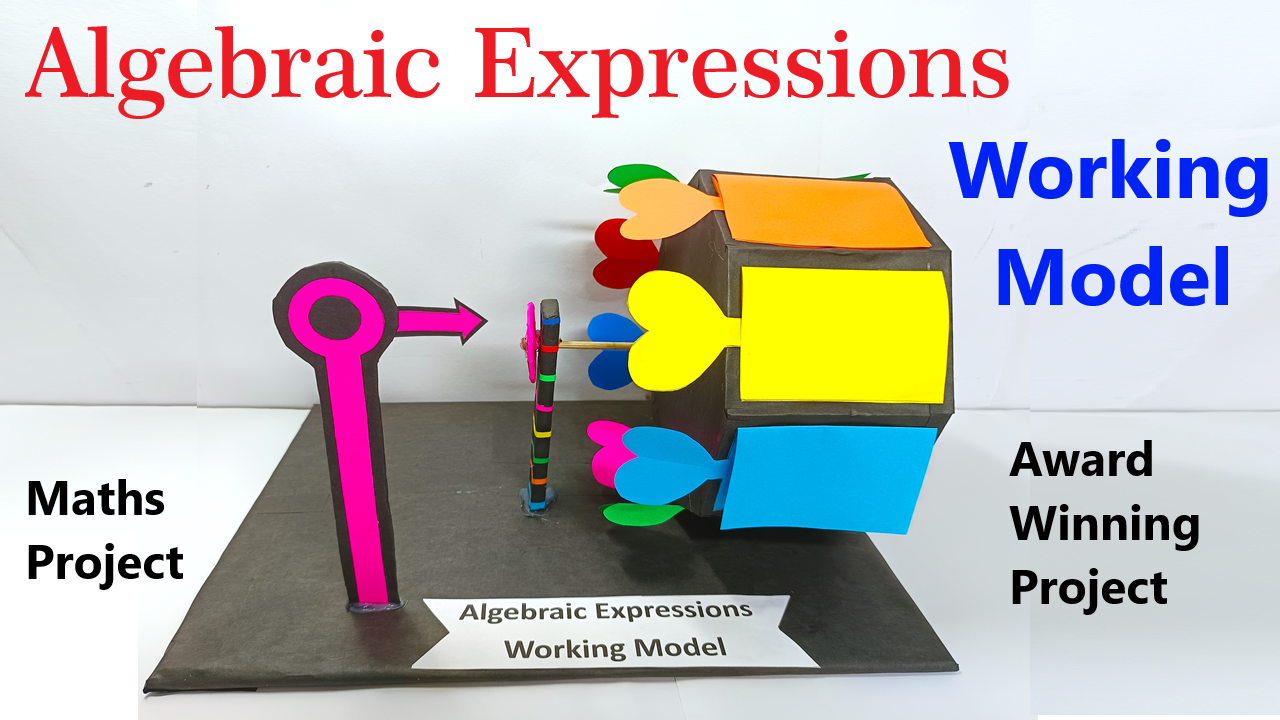Creating an algebraic expressions working model using an octagon-shaped cardboard box with a rotating mechanism and picking expressions during the rotation is an engaging and creative project.

Here’s a step-by-step guide to build this interactive model:
Materials Required
- Cardboard: To construct the octagon-shaped box.
- Colored Paper: For decoration and labeling.
- Chopsticks: For the picking mechanism.
- A Thin Rod or Skewer: To serve as the axis for rotation.
- Glue and Tape: For assembling the model.
- Markers or Pens: For writing algebraic expressions.
- Scissors and Cutter: For cutting shapes.
- Ruler and Compass: To ensure precision.
Steps to Create the Algebraic Expressions Model
1. Construct the Octagon-Shaped Box
- Cut the Base and Top:
- Draw and cut two identical octagon shapes from cardboard.
- These will form the top and bottom of the box.
- Create the Walls:
- Cut rectangular strips of cardboard for the sides of the box (width depends on the height of the box).
- Attach the strips to the base using glue or tape to form a box structure.
- Attach the Top:
- Leave one side of the top slightly loose or use a flap for accessibility.
2. Add Rotating Mechanism
- Insert a Rod or Skewer:
- Pierce a hole in the center of the top and base octagon.
- Insert the rod through these holes, ensuring it rotates smoothly.
- Secure the Rod:
- Use glue or small washers on both ends to hold the rod in place while allowing rotation.
3. Prepare the Algebraic Expressions
- Write Expressions:
- Cut small cards from colored paper and write different algebraic expressions on them.
- Example expressions: 3x+53x + 53x+5, x2−4x+6x^2 – 4x + 6×2−4x+6, 2xy−y22xy – y^22xy−y2, etc.
- Attach Inside the Box:
- Stick these cards on the inner walls of the octagon box in each section.
4. Build the Picking Mechanism
- Prepare the Chopstick:
- Attach a small pointer or hook at one end of the chopstick to help pick up cards.
- Insert the Chopstick:
- Cut a small slit or hole on the top of the box for the chopstick to move freely.
- Ensure it can reach the cards inside while the box rotates.
5. Decorate the Model
- Cover the exterior of the box with colorful paper for a neat look.
- Add labels like “Spin to Learn Algebra!” to make it interactive and appealing.
6. Add Finishing Touches
- Interactive Simulation:
- As the box rotates on the rod, the chopstick can pick one card at a time through the slit.
- When the rotation stops, the expression picked can be solved or discussed.
- Optional Features:
- Add a small spinner on the top to determine how many rotations to make.
- Include algebraic problem cards in addition to expressions for variety.
How to Use the Model
- Rotate the Box:
- Turn the box using the skewer to mix up the cards.
- Pick a Card:
- Use the chopstick to pick one expression at random.
- Solve and Discuss:
- Write the expression on a board or paper and solve it collaboratively.
Benefits of the Model
- Interactive Learning: Makes algebra fun and engaging.
- Skill Development: Enhances problem-solving and critical thinking.
- Visual Appeal: Attractive design captures interest in exhibitions.
This project is simple yet creative and ensures a hands-on understanding of algebraic expressions. Let me know if you need assistance with templates or further clarification!

